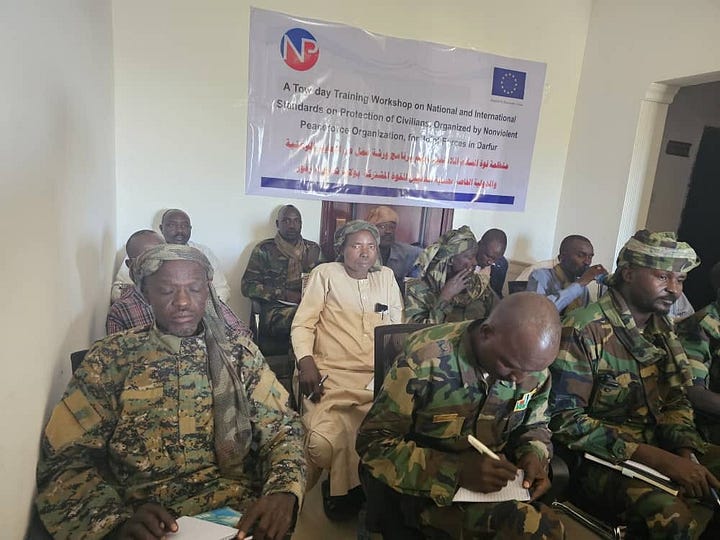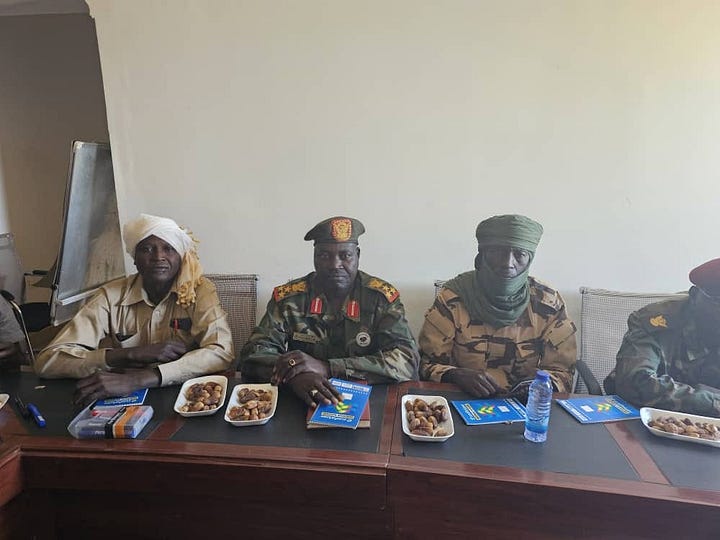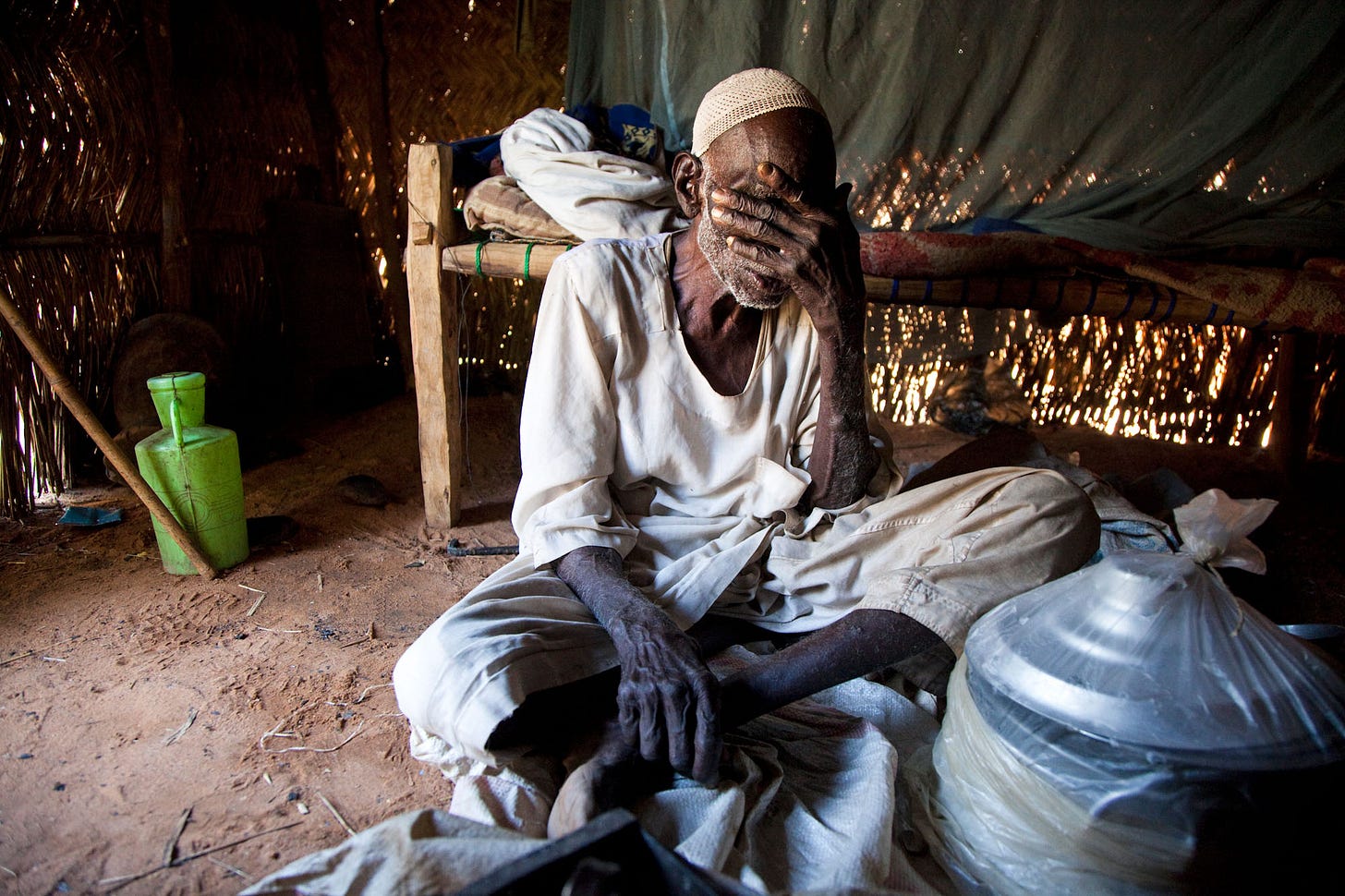Full Text: UN Panel of Experts Report on Sudan
Plus: Updates on political and military developments
A report by a five-member panel of researchers appointed by the UN Security Council details conflict dynamics in Darfur and violations of a long-standing UN arms embargo, including by the United Arab Emirates.
The report estimates the death toll of the ethnic cleansing in El Geneina last year at 10,000 to 15,000—substantially higher than previous estimates. This toll, if accurate, would exceed the Srebrenica massacre of 1995, which is remembered as the worst mass murder in Europe since World War II.
The New York Times, Reuters, and Bloomberg first reported this and other findings of the UN Panel several days ago, but this is the first time that the report is published in full. The UN has not yet officially released the document.
The UN Panel of Experts collected evidence of the El Geneina killings from over 120 victims and eyewitnesses, as well as documentary and photographic evidence already gathered by civil society organizations and UN agencies. The Panel concluded, “The attacks were planned, coordinated, and executed by the Rapid Support Forces (RSF) and their allied Arab militias.”
Like the Hutu against Tutsi massacres of 1994, these killings were carried out on an ethnic basis by the predominantly Arab RSF against the Masalit tribe. Recruitment and preparations for the massacres began before the outbreak of the civil war between the RSF and the Sudan Armed Forces (SAF), demonstrating the close connection between the RSF’s bid for national power and the more local battle for ethnic supremacy in Darfur.
The UN report stated,
“The largest mobilization (of Arab fighters) within El Geneina took place weeks before 15 April, when clashes in Khartoum commenced, and went on until 24 April (phase 1 of the conflict in El Geneina). These militias were assembled in various areas in El Geneina and surrounding areas… RSF established local headquarters in neighborhoods that served as operations centers.”
“In addition, allied militias established their own operational centres which were frequently visited by RSF officers for coordination purposes.”
These details add to the growing body of evidence implicating the RSF directly in this mass atrocity, including two investigations published by Reuters. Beyond El Geneina, the Masalit were targeted in other towns too, including Sirba, Mornei, and Masterei.
Despite the ethnic nature of the killings, the report stressed, “It is important to note that not all members of the Arab communities were involved in the violence, and that many actively protected the Masalit people. Masalit individuals found refuge in the homes of their Arab neighbors, who assisted them in escaping to Adré, Chad.”
UAE supplied weapons to the perpetrators
Citing sources among armed groups and tribal leaders in eastern Chad and Darfur, the UN Panel corroborated earlier reports that the United Arab Emirates (UAE) provided weapons to the Rapid Support Forces. The oil-rich Gulf Arab nation had a relationship with the RSF since before the current war, having employed its members as mercenaries in Yemen.
Flights trackers documented the cargo flights from the UAE to the eastern Chadian town of Amdjaras. From there, the local sources reported that weapons and ammunition were loaded on trucks and taken into Darfur in small convoys, where they were handed over to the RSF.
“RSF transported the shipments to their base in Zuruk (Um Baru Locality, North Darfur). Some weapons were then distributed to RSF positions in Darfur, while most were transported from Zuruk to Khartoum through desert roads… Several RSF filed commanders, chosen for their knowledge of the border area and desert routes, oversaw the transportation of the weapons in to Darfur and Sudan... These large-scale and sustained supplies ranged from small and light weapons to UCAVs (drones), anti-aircraft missiles, mortars and various types of ammunition.”
By engaging in these arms transfers, the UAE violated a UN Security Council arms embargo that was imposed nearly two decades ago, in 2004.
The current panel of experts was mandated to monitor compliance with that ban. The five-member team, appointed two weeks before the outbreak of the current civil war, included members from Colombia, France, Russia, Sweden, and Kenya.
The UAE’s Permanent Mission to the United Nations issued a letter of reply to the UN Panel, which was included as an annex to the report. The letter does not specifically deny supplying weapons to the RSF, though it affirms the UAE’s “continued commitment to comply with its obligations under the sanctions regime [arms embargo] established by the Security Council.” It also detailed humanitarian shipments that it sent to Amdjarass, including the tonnage of various supplies, and it invited hte Panel of Experts to visit a field hospital it built in the Chadian border town.
Open-source researchers who specialize in flight tracking have doubted that so many flights would be needed for just building a field hospital. The UAE admitted to sending 122 flights to Amdjarass.
The report also detailed supplies of weapons arriving to Sudan from Libya and the Central African Republic. Previous reporting has indicated that some supplies via Central Africa came from the Wagner mercenary group—though this was not mentioned in the report. Furthermore, the report detailed a fuel supply line established by the RSf through South Sudan.
European Union sanctions Sudanese businesses
The European Union has sanctioned six companies that it says are linked to the warring parties in Sudan. In a press release, the European Council stated,
“Among the entities listed are two companies involved in the manufacture of weapons and vehicles for the SAF (Defense Industries System and SMT Engineering); the SAF-controlled Zadna International Company for Investment Limited and three companies involved in procuring military equipment for the RSF (Al Junaid Multi Activities Co Ltd, Tradive General Trading and GSK Advance Company Ltd). The entities listed are subject to asset freezes. The provision of funds or economic resources, directly or indirectly, to them or for their benefit is prohibited.”
The United States and United Kingdom had already sanctioned some of these firms.
In Brief
A landmine explosion on a bus near Shendi in River Nile State has claimed ten lives, and is believed to be the first deadlye landmine explsion of the war.
An atmosphere of paranoia has gripped Kassala State, amid fears of an “internal attack,” according to a state media report January 20.
A French nonprofit, Promediation, working with the French and Egyptian foreign ministries, has convened a workshop in Cairo with the participation of several different Darfur armed groups, aimeding to reduce tensions in the region.
Bank of Khartoum laid off 1,215 employees, representing 45% of its staff nationally, another step in an ongoing economic collapse. The bank has 125 branches, dozens of which were closed, including some that were looted.
The Sennar State government along with military and security authorities held a mass rally for “popular resistance” in Al-Suki Locality. As reported by the state news agency SUNA, the governor in his remarks praised hte purported role of the “popular resistance “ in repelling an RSF incursion in the Jebel Muya area. The deputy commander of the 17th Infantry Division and the police commander in the state also spoke at the rally, praising and encouraging the arming of civilians.
The Ad-Douiem garrison held a parade for 1,200 trainee soldiers January 21, SUNA reported, overseen by Col Hamad Barshom, commander of the brigade based in Ad-Douiem, and Lt Col Muhammad Suleiman, the reserve commander.
A fire broke out in the Dharaba mine, which is about 30 kilometers away from the Songo area in South Darfur. Field sources deny that it was bombed by aircraft, despite media reports talking about aerial bombardments that affected the area.
Former Darfur armed movements in El Fasher, which are neutral in the current war, participated in a workshop by Nonviolent Peaceforce yesterday to discuss compliance with international laws on protection of civilians.


11 people were killed, including seven women and two children, in addition to one wounded, in an airstrike carried out by the Sudanese air force on the village of Ib Khubub west of the city of Mujlad in West Kordofan on Sunday. A local tribal leader, Omda Al-Jak Suleiman, told Radio Dabanga on Monday that an Antonov plane dropped 5 explosive barrels on the village.
RSF troop movements were observed yesterday nearby Mujlad, in the town of Babanusa, West Kordofan, amid escalating threats to attack the 22nd Infantry Division, according to our monitoring of unofficial RSF social media pages. Limited clashes were reported this morning in the city.



